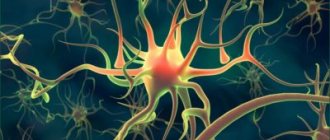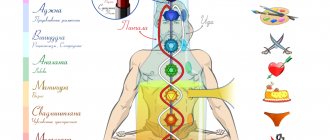Updated July 23, 2021 805 Author: Dmitry Petrov
Hello, dear readers of the KtoNaNovenkogo.ru blog. Emotions are something that plays an important role in our lives.
Without them, it would be very difficult to interact with other people and understand oneself.
But what are emotions? Where do they come from, how do they affect our physiological state, what types of emotions are distinguished and what functions do they perform?
And finally, the Top 10 commonly used emotions that need to be clearly understood.
Emotions are...
In simple language, emotions are a situational manifestation of emotional experiences. This is an internal response to current events, a reaction.
Translated from Latin, the word “emotion” means “shocked” or “waved,” that is, it is a process in which a person is not calm: while evaluating something, he somehow experiences it.
The state of experiencing an emotion covers the whole person: various organic reactions are triggered inside, facial expressions, gaze, voice, body position and behavior change on the outside.
For example, someone stepped on your foot and didn’t even apologize. At this second, a thousand different thoughts flash through my head: “How painful! The boot is now dirty! What an impudent man! I could have apologized!”
If you assessed what happened as infringing on your personal dignity, then in response you can either be offended, or become irritated, remain silent, or launch a verbal (and maybe physical) attack on the offender. How many people there are, so many reactions, which depend on the character of each of them.
Emotions come in different types (joy, sadness, delight), they paint our state with multi-colored colors - the “richer” and more experienced a person is, the more ways he knows to react and the more fully he can live his life.
And, conversely, those who only know how to be happy and sad, who divide the world into black and white, good and bad, are unlikely to call their existence bright and satisfactory.
Do we need negative emotions as well as positive ones?
Look at the list of negative emotions. Would you be willing to volunteer to try any of them? Probably not, and this is not surprising! We have already talked about the harm of negative emotions on physical health in an article about psychosomatics .
Here are some examples of identified patterns between negative emotions and human diseases.
Now refer to the list of examples of positive emotions. It is easy to see that this list is full of pleasant experiences that people strive to find and prolong. We need positive emotions to function effectively, grow and prosper.
So, if we generally dislike experiencing negative emotions and enjoy experiencing positive ones, do we even need negative experiences? As it turned out, yes. Next, we will look in more detail at why this happens.
Emotions and feelings - what's the difference?
Often, when talking about emotions and feelings, people mean the same thing. In essence, this is so: both the first and the second represent an internal process of experiencing. The only difference between them is the duration of the process itself:
- the emotion does not last long - you bought something you have long dreamed of. How long will you rejoice? Well, an hour or two. Then the emotion of joy will begin to subside. Perhaps tomorrow you will start dreaming about something else. Or a passing car splashed you with mud on the street, you will get angry or upset, but you will soon forget about this trouble;
- feelings are long-term in nature - they are emotions that are stable over time: I love my child from the day he was born and will love him all his life. I'm also still mad at that girl from kindergarten who stole my candy from my cupboard (so many years have passed and I'm still mad!). In this case, love and anger are feelings that have been present in my life for a very long time.
Emotions tend to transform into feelings.
If we are talking about a positive range of experiences, then this is good. But if a person carries negative experiences with him for a long time, then they corrode him from the inside, make him suffer, and have a toxic effect on his entire life.
This happens for the following reason (take the situation with stolen candies): as a child, I became very angry when I saw that my candies were missing. I told my mother and teacher about this, but none of them could influence the situation.
The girl continued to steal my candies, and I never said a word to her (why is unknown). Thus, my emotion of anger remained unreacted and was transformed into a feeling of anger that has been living with me for 30 years.
Hence the conclusion: any emotional reaction must be responded to, expressed , brought out in a word, action, gesture.
If you're angry, say so. If you can’t say (you don’t always want to ruin relationships with others), beat a pillow, write an angry letter and burn it, mold an image of the offender and break it.
The main thing is to show how angry you are. If this does not happen, then the energy generated by the emotion remains in the body, becoming a feeling, or even a gestalt (what is it?).
Cognitive content
According to this classification, feelings are divided into simple and complex. The first ones are fast and bright (anger, joy). They occur momentarily, immediately upon encountering a factor that motivates them (for example, when a guy invites a girl on a date, she rejoices). The second ones are longer and often contradictory (after receiving an invitation, she begins to analyze the situation and doubt).
Physiological aspect of human emotions
Human emotions are experienced at the physiological level. This is about the fact that the psyche is tightly connected with the body: they mutually influence each other. If I think that I am in danger, I will experience the emotion of fear, which will entail the following changes in the body :
- all senses will become sharper - for example, dilated pupils are needed in order to better see space;
- adrenaline will enter the bloodstream - a hormone that mobilizes the entire body and improves physical performance (endurance);
- breathing quickens;
- blood flow increases speed;
- the heart speeds up;
- blood pressure rises;
- the stomach shrinks into a lump;
- an attack of diarrhea, etc. is possible.
All these physiological changes are necessary so that I can escape, driven by the instinct of self-preservation, which screams at me: “Run! It's dangerous here! in response to my thought about the threat.
Thus, the body adapts to what we think and how we experience reality.
This is why it is important to maintain psychological hygiene: cultivate positive thinking , which entails positive emotions. A calm, peaceful body releases hormones of happiness and pleasure, does not get sick, and is able to heal itself.
Forms and examples of emotional processes
- The emotions themselves. They can appear both in a collision with really existing situations, and when thinking about imaginary, non-existent events. They allow you to express satisfaction or dissatisfaction with what is happening, and give it an assessment based on the individual’s personal experience.
- Feelings. They are always stable (not momentary) and are distinguished by their brightness of expression. You can feel passion, love, resentment.
- Mood. The longest lasting mental state that affects the actions and well-being of the individual as a whole over a long period.
- Affects. An extreme form of expression that encourages short-term, uncontrollable changes in behavior. Completely irrational and very violent.
The relationship between the sensual and emotional sides
A more stable manifestation of emotionality is feelings. They, as a rule, arise on the basis of the needs of the second level (spiritual) and form a certain position, a person’s point of view. Classified according to the subject they are aimed at:
- Intelligent. Occur during mental activity (surprise, doubt, curiosity).
- Aesthetic. Their development is associated with the perception of beauty (love of art or some of its aspects, admiration for beauty).
- Moral. They characterize an individual’s attitude towards the behavior of other people. This assessment in most cases depends on the norms existing in society (humanity, altruism, friendship, compassion, pity, love).
There are also such concepts as state and reaction. They differ in the degree of duration and correlate the needs and aspirations of the individual with his capabilities and resources at the moment.
What are they for (functions of emotions)
Emotions show a person’s subjective attitude towards others and the world, situations, phenomena, events in which his needs lie.
Perhaps this is their main function ( signal ) - to show what a person wants. Besides this, there are three more:
- motivational-regulatory - experiences guide a person’s behavior, suggest what needs to be done and how to act;
- communicative - with the help of emotions we understand each other better, “reading” the internal state of people (this is called empathy). Surely you can clearly distinguish when a person is angry, happy or sad. This understanding gives you the opportunity to formulate a further plan of action;
- protective function - in some cases, emotions save us from any threat. Fear forces you to leave a dangerous place. Anger broadcasts to others: “Move away, don’t touch me, or you’ll get it.”
Emotions are a marker that demonstrates what is happening inside at this moment (and not only).
If I believe that all people are kind, good and wish me well, then someone who steps on my foot will not cause a violent, negative reaction in me. It's an accident, it happens. And if he didn’t apologize, it doesn’t mean he’s a boor. Perhaps he just didn't even notice it. And if he noticed, he would definitely ask for forgiveness.
But if in my picture of the world all people are terrible evil spirits and scoundrels, then in the situation described above, I will definitely think that they stepped on my foot on purpose, I will get terribly angry, taking what happened as a personal insult, and I will behave aggressively.
Frequently used emotions represent a psychological portrait of a person: his character, way of thinking and being.
A look from psychology
People have been studying emotions for years. Given the difficulty of focusing on feelings, it is not surprising that we know little about them. Most people lack an understanding of the necessity of both emotions for healthy functioning and a full range of feelings. Let's start with definitions and find out the types of feelings and impressions when certain emotions arise, what is their source and how to create them yourself.
Definition and meaning of positive emotions
Positive emotions are emotions that we generally find pleasant to experience. The Oxford Handbook of Positive Psychology defines them as “pleasant or desirable situational responses, distinct from pleasant feelings and undifferentiated positive affect.”
Essentially, this definition states that positive emotions are pleasant reactions to our environment (or our own internal dialogue) that are more complex and goal-directed than simple sensations.
Definition and meaning of negative emotions
On the other hand, negative emotions are those that we usually don't like. Negative emotions can be defined as “unpleasant or unhappy emotions that are evoked by people to express a negative impact on an event or person.”
If an emotion lowers your emotional state and worsens your mood, then most likely it is a negative emotion.
Learn more about conflicting feelings and cognitive dissonance.
Types of emotions
There are many classifications, in each of which the author identifies his own types of emotions.
For example, you can divide them into positive, negative and neutral. Depending on their intensity, they can be sthenic (accompanied by bright manifestations) and asthenic (low human activity).
In psychology the following list is most often mentioned :
- basic - these are those emotions that are inherent in any person, regardless of his gender, age, nationality, country of residence and cultural experience (everyone knows how to be sad and happy);
- variable - polarity of the basic ones, due to personal and cultural characteristics;
- innate - those with which we are born (for example, fear);
- acquired – acquired in the course of life;
- elementary – simple emotions;
- compound – a combination of elementary ones;
- natural – laid down by nature;
- cultural – learned;
- cognitively simple - a reaction to a simple stimulus;
- cognitively complex - born after a deep analysis of the situation.
How to learn to recognize negative emotions in yourself and others
Emotional intelligence is a course from the brain development platform Vikium. It consists of 20 lessons and is designed to improve identification, understanding, management of your emotions, as well as to recognize the emotions of others.
The author of the course is Oleg Kalinichev. He is the director of Paul Ekman International in Russia.
Paul Ekman is a world expert in the psychology of emotions, deception detection and nonverbal behavior:
- included in the top 100 most influential people in the world;
- intelligence consultant for the CIA, FBI, Scotland Yard;
- the world's best “LIVING LIE DETECTOR” Forbes;
- 50 years of scientific research;
- author of 170 scientific papers and 15 books;
- scientific consultant for the TV series “Lie to Me” and “Inside Out”.
What you can learn by taking this course:
- recognize deceitful people you meet at work and in your personal life;
- see the manifestation of empathy and other hidden emotions;
- the ability to “read” the interlocutor;
- determine where the information leak occurred;
- the ability not to show off your emotions;
- the ability to see the manipulator;
- improve relationships in your personal life;
- become confident.
The cost of training is 990 rubles. Registration is made automatically on the website.
Within 7 days you can get your money back if you are not satisfied with the course.
You can already find out how developed your EQ is. To do this, take an online emotional intelligence test.
There is also an article on levelself.ru that contains the best courses on EI.
Check out 14 EQ courses
Why is it important to understand your emotions?
Unfortunately, many people are not even aware of what emotions are and how to deal with them. What does this mean?
A person who does not understand his experiences does not understand himself, does not hear his needs. He doesn't get what he wants and therefore life doesn't seem like much fun. Hence depression and other neurotic disorders.
A clear example on this topic: a guy gets excited every time he has a date with a girl. His experiences are so strong (his face turns red, his hands are shaking, his mouth is dry, he is fainting) that every time he refuses the meeting. He has been alone for a long time and suffers from this.
If the man described above had recognized his emotions, he would have realized that he was experiencing fear. What is it based on? The guy is afraid that the girl will not like him, he doesn’t want to be rejected, because for him this is a disaster. What need is he concerned with at the moment? To please the female sex, to be in demand, desired, accepted.
Having mentally reached this point, perhaps he would have thought that there was no need to worry so much. In the end, there are many girls, and something will definitely work out with one of them.
Psychophysiology and needs
Jealousy in relationships - the psychology of this feeling towards each other
Social and biological needs are the main force that drives the human psyche and behavior. They depend on the habitat and development of the organism. Studying the human central nervous system (CNS), scientists have identified structures in it for emotional states. They are affected by the functions of the limbic system, hypothalamus and thalamus. The centers of emotions are located in these formations of the central nervous system: positive and negative.
Human needs according to A. Maslow (American psychologist)
Any emotions and emotional states are important for a person, except tension. Increased tension will definitely lead to fears, anxiety and phobias. It is necessary to consciously exclude all negative emotions that lead to anxiety.
Response scale
This technique is a questionnaire of 25 statements that determines the degree of development of empathy in an individual.
The person taking the test needs to rate his/her agreement: always, often, rarely, never.
| № | Judgment | Answer | |||
| IN | H | R | N | ||
| 1 | I feel sad when I see someone feeling lonely in company. | ||||
| 2 | When those around you cannot restrain themselves and openly show their emotions, it is unpleasant. | ||||
| 3 | When a person gets excited next to me, I feel the same. | ||||
| 4 | I believe that tears of happiness are stupid. | ||||
| 5 | I also experience the troubles of my friends. | ||||
| 6 | Sometimes love songs make me sensitive. | ||||
| 7 | I would be very worried if I had to convey bad news to anyone. | ||||
| 8 | My condition is greatly influenced by my environment. | ||||
| 9 | I would like to have a job that involves communication. | ||||
| 10 | I love seeing people receive gifts. | ||||
| 11 | When I see/hear that a person is crying, I get upset myself. | ||||
| 12 | Listening to certain music makes me feel happy. | ||||
| 13 | When I read a work of fiction, I worry so much, as if all this is happening in reality. | ||||
| 14 | I get angry when I see a person being treated horribly. | ||||
| 15 | I can remain calm even when everyone around me is panicking. | ||||
| 16 | It makes me nervous when people shed tears. | ||||
| 17 | When I make a decision, no one else's opinion usually matters. | ||||
| 18 | I also get angry when people around me are worried about something. | ||||
| 19 | I get worried if I see people worrying about trifles. | ||||
| 20 | I get worried when I see animals suffering. | ||||
| 21 | It's stupid to worry about what happens in a book or movie. | ||||
| 22 | I feel sad when I see weak people. | ||||
| 23 | I get very emotional when watching a film. | ||||
| 24 | I can be indifferent to any disturbance going on around me. | ||||
| 25 | Children cry for no serious reason. | ||||
Ask a question
Results
| № | Number of points per answer | |||
| B – I agree (always) | H - often | R - rarely | N - never | |
| 1 | 4 | 3 | 2 | 1 |
| 2 | 1 | 2 | 3 | 4 |
| 3 | 4 | 3 | 2 | 1 |
| 4 | 1 | 2 | 3 | 4 |
| 5 | 4 | 3 | 2 | 1 |
| 6 | 4 | 3 | 2 | 1 |
| 7 | 4 | 3 | 2 | 1 |
| 8 | 4 | 3 | 2 | 1 |
| 9 | 4 | 3 | 2 | 1 |
| 10 | 4 | 3 | 2 | 1 |
| 11 | 4 | 3 | 2 | 1 |
| 12 | 4 | 3 | 2 | 1 |
| 13 | 4 | 3 | 2 | 1 |
| 14 | 4 | 3 | 2 | 1 |
| 15 | 1 | 2 | 3 | 4 |
| 16 | 1 | 2 | 3 | 4 |
| 17 | 1 | 2 | 3 | 4 |
| 18 | 4 | 3 | 2 | 1 |
| 19 | 4 | 3 | 2 | 1 |
| 20 | 4 | 3 | 2 | 1 |
| 21 | 1 | 2 | 3 | 4 |
| 22 | 4 | 3 | 2 | 1 |
| 23 | 4 | 3 | 2 | 1 |
| 24 | 1 | 2 | 3 | 4 |
| 25 | 1 | 2 | 3 | 4 |
| Sum | ||||
Now calculate the results:
- 11 points - extremely reduced level of empathy;
- 12-36 - low;
- 37-62 - normal;
- 63-81 - high;
- 82-90 - elevated.
Summarizing
So, emotions are an important chemical process inside the human brain that regulates the psychological part of his life.
Feelings help us respond to any stimuli from the outside world. As a rule, they are accompanied by some changes in the body. They are divided into several types and have many functions. They brighten up our lives and, without any doubt, are our internal guidelines that help us choose the right step in any situation.
People need to be sure to respect their emotions and not keep them inside, as this can be dangerous due to the possibility of falling into depression and other mental illnesses.










